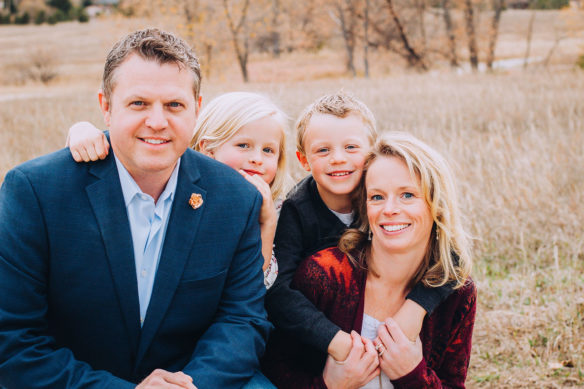
Jason Glass, left, was named July 10 by the Kentucky Board of Education as Kentucky’s new education commissioner. He and his wife Sarah, a teacher, have two children, 8-year-old Norah and 7-year-old Chase. The children will attend a Kentucky public school this fall.
Submitted photo
By Sky Carroll
sky.carroll@education.ky.gov
Coming from a family of Kentucky educators, Jason Glass had a passion for learning, community and democracy. Now, with an extensive and diverse array of educational and professional experiences, he has been able to turn those passions toward the work of being Kentucky’s next commissioner of education.
“I didn’t grow up knowing I was going to be a teacher, and then a superintendent, and then a state commissioner. I couldn’t have foreseen that as my path, but I knew that I loved learning, I cared deeply about our community and I was proud of our state and country,” he said. “I knew I needed to be in service of all three of those.”
Glass, 48, sees his role as Kentucky’s new commissioner as the ideal chance for his values and his passions to come together to serve the 648,000 students who attend public schools in the Commonwealth.
“I grew up seeing the connection between the school and the community and how important they are in supporting each other. When the school needed the community, the community was there,” Glass said. “The other side of that was also true. The school supported the community.”
Glass grew up in Brandenburg, the middle child of Jim and JoAnn Glass. Both were teachers in Meade County. His grandmother was also a teacher. His sister, Jennifer, is currently a teacher in Metcalfe County, and his brother, Greg, works as an assistant director of transmission systems at Kentucky Educational Television.
A 1990 graduate of Meade County High School, Glass attended the University of Kentucky where he earned a bachelor’s in political science and history in 1994 and then completed a master’s in teaching in 1996.
Glass landed his first teaching at Hazard High School in the Hazard Independent School District in eastern Kentucky, where he taught World Civilizations and Geography. He also coached football and track.
After teaching during the day, coaching football and track in the afternoon and then planning upcoming lessons, Glass recalled the grueling hours that came with his first year of teaching.
“It was tons of work and humbling, but exhilarating and challenging at the same time,” he said. “I remember the lessons that went well, where it just felt like magic. The kids were engaged, I was engaged. It just felt like the world was spinning around us, but we were all present in that moment.”
He also admitted he had his share of struggles as a new teacher.
“It was really hard work and I had to learn almost daily from my mistakes,” he said. “I had to learn to be a teacher and a learner at the same time.”
Even though Glass loved his time in the classroom, he’d always been interested in policy work related to education. He went back to UK and started in its graduate political science program, where he earned a master’s in political science. During that time, he also was teaching undergraduate courses at UK and Georgetown College. Later, Glass earned his doctorate in education leadership from Seton Hall University in New Jersey. He also holds a certificate in advanced education leadership from Harvard.
In 2001, Glass picked up and moved to Colorado after taking a position in Colorado’s Department of Education. Living in Denver, he worked in special education, data systems and assessment. He also spent time helping develop one of the first early childhood quality rating systems in the country.
After meeting his wife, Sarah, who was teaching in a district north of Denver, the two got married and decided to move to Eagle County in Colorado.
“Sarah and I fell in love and decided we wanted to live in the mountains for a few years,” Glass said.
In Eagle County, Glass first served as the director of research and assessment and then as human resources director. His wife taught 3rd grade at one of the elementary schools.
After living in Eagle County for about four years, Glass took a job in Ohio working for the nonprofit Battelle for Kids, where he did work related to President Barack Obama’s Race to the Top initiative. Then, he received a call from the governor’s office in Iowa.
In 2010, Iowa Gov. Terry Branstad selected Glass to be Iowa’s director of education, the state’s equivalent to Kentucky’s commissioner of education.
“Iowa really wanted to pass meaningful educational legislation in the state. We really had to work to lift the policy debate out of the partisan ruts on both sides and ask people ‘What are your aspirations for your schools? What are your aspirations for your children? How can we build an education reform agenda around those aspirations?’” Glass said.
While in Iowa, Glass became interested in international benchmarking, or looking at education systems around the world for ideas and innovations.
“We needed a strategy that would improve education for not just a few schools, but the entire state of Iowa,” he said.
Glass started looking at the education agendas of high-performing international systems and found they were following a very different path than we were on in the United States.
“The best international systems were focused on raising up the teaching profession, aligning supports to meet students where they were, and on teaching and learning,” Glass said.
In 2013, Iowa was able to pass bipartisan landmark education reform that created a statewide system of teacher leadership for the state. Glass said he is proud that the legislation achieved overwhelming bipartisan support and has stood the test of time. The teacher leadership program is voluntary, but every district in the state is participating.
Having had two children while living in Iowa, Jason and Sarah returned to Colorado after he accepted the superintendent position in Eagle County, a 7,000-student district located in the heart of the Rocky Mountains.
“We thought it would be great for our kids to experience growing up in a mountain town, so we moved to Eagle County where I was the superintendent for four years,” Glass said.
In 2017, Glass became the superintendent in Jefferson County, Colorado –which the locals call “Jeffco.” Jeffco Public Schools serves approximately 85,000 students in the western part of the Denver metro area.
Glass said that his time in Jeffco has taught him that “education is political, but it doesn’t have to be divisive.”
“If we look beyond all the labels we put on ourselves and others, everyone loves their children and wants the best for them and everyone wants the community’s schools to be strong, vibrant and of quality.”
Glass says his family was happy in Jeffco and he had just started a new five-year contract with the district. But when the opportunity to serve as education commissioner in his home state of Kentucky arose, he couldn’t pass up the chance to apply.
“At this point in my life, I felt like I had the background and experience to contribute to Kentucky. I was ready to serve,” Glass said.
One of the challenges facing Kentucky and states across the country is how to address racism and racial trauma in schools. Glass said he believes that it is time – past time – to do something.
“We have to take a hard look at our education system and ask, ‘What are we doing that is contributing to racism and what can we do to create something better?’” he said. “All forms of prejudice are learned and they can be unlearned.”
Glass thinks that addressing racism and bias in schools involves multiple steps and believes it must be an ongoing effort. He sees at least three crucial steps: training on concepts such as implicit bias and systemic oppression, reviews and analysis of policies and outcomes and a long-term action plan committed to ending racism in schools.
Another major issue Glass is prepared to address is Kentucky’ educational restart efforts in response to COVID-19 and how the Kentucky Department of Education can continue to support its schools in successfully navigating these uncertain and uncharted waters.
“We will continue to support our districts and schools and provide them the guidance they will need to get through this time,” he said. “I think the first thing that we will have to do when we reopen schools is establish relationships. We will also need to focus on identifying where our gaps are and understanding those and we will then have to re-teach the critical elements so that our students are ready to progress forward.”
As for the future of Kentucky education, Glass is excited to “reimagine what school can be.”
Right now, Glass sees the traditional education model as one that focuses primarily on the “acquisition of content.”
While content is still important, Glass feels that it isn’t enough and hasn’t been for some time.
“The skills necessary for students to succeed when they grow up and compete in a global economy are far beyond fact memorization and basic computation,” Glass said.
“When we think about reimagining education, it’s shifting our education system to be one that has been primarily focused on the transmission of content from one generation to the next into an experience that really prepares our kids for a complex, interconnected, globally competitive and instantaneous future,” he said. “If we aren’t changing the experience of our students in a profound and meaningful way that prepares them for their future, then we really aren’t changing anything at all.
“The challenge for all of us is in changing the experience in school so that we really prepare kids for life.”
Glass said he has found his calling and his home in education, because it gives people the opportunity to positively shape the future, an idea that only grew when he became a father.
His two children, 8-year-old Norah and 7-year-old Chase, will attend a Kentucky public school in the fall.
“To work in education is to connect with and influence the future,” Glass said. “I can’t imagine any other more important or meaningful work.”
He is also excited to arrive in Frankfort and meet his new team of 1,000 employees at KDE, whose mission is to provide leadership and support to ensure each student is empowered and equipped for a successful future by engaging districts and schools, industry and business, and students, families and communities.
“The mission of Team KDE is aligned with my mission and vision and my hope for every child in Kentucky,” Glass said. “I am so incredibly grateful to the Kentucky Board of Education for this opportunity to serve and I am excited to embark on this effort. I believe that we will rise to meet the challenges before us and create the education system the Commonwealth’s children deserve. I know that our best days are still before us.”
MORE INFO …




Jason Glass is the real deal! Tremendous hire for our children’s future! He’s had “boots on the ground” teaching in Kentucky and born and raised in the Commonwealth. Outstanding person…very honored to say that I’ve had the opportunity to work with him during his time at Hazard High School!
Maurice Dixon